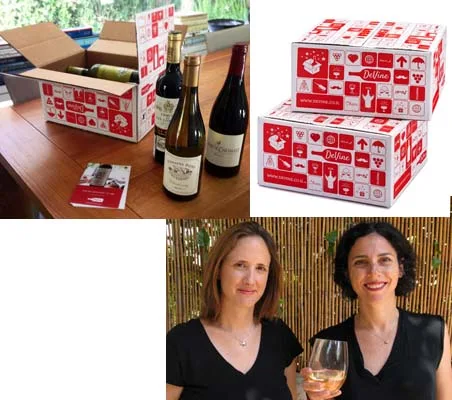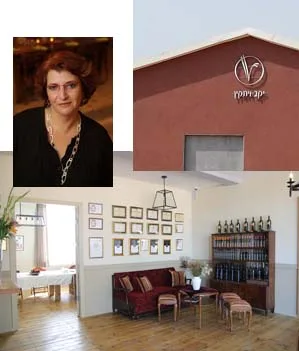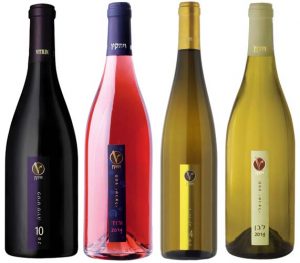Way back in 1969, Tony Laithwaite and his wife Barbara used to travel to France in a beat up white van, purchase wine and come back to England to sell it to their own data base of friends and family. They set up shop under an old railway archway, called their start-up company Bordeaux Direct and began with a mere 150 customers. In 1973 it developed into the Sunday Times Wine Club, received respectability and took off.
From small beginnings, this small acorn grew to a mighty oak. It is now a very large company trading as Direct Wines, which is basically an umbrella for a number of well-known subsidiaries such as Averys, Laithwaites, The Sunday Times Wine Club and The Wall Street Journal Wine Club. These are mail order companies and wine clubs which sell more wine than the total annual production of Israel. The group has three core markets in the UK, USA and Australia. The moto of the company is ‘from the vineyard to your door.’
Their success is based on the inherent laziness of the customer who says ‘I am interested in wine and like drinking it, but don’t want to be bothered with the hassle of choosing it and delivering it’. The system works only if the choice is constantly innovative to stimulate the purchaser. The quality must be good and the wines should be particularly good value. However, above all else, the customer service has to be outstanding.
I for myself love browsing in wine shops and book shops. I like the whole dance which involves talking wine with the wine knowledgeable staff, maybe tasting something too. I like to be able to touch bottles, picking them up for a closer look and, occasionally reading back labels. In short, the act of buying is for me part of the experience.
However imagine you like wine as I do, but do not have time to search. You visit the supermarket or wine shop and experience that momentary panic when confronted with a wall of wine. You have no idea where to start, what to order and don’t like to ask. Also, you have no time to study the shelves.
I have similar feelings when I enter a Japanese or Sushi restaurant. I like Sushi but have no idea what all the names mean. I like to be led. I am a sucker for the waiter recommendation, which I usually accept with grateful relief.
Buying by the case means heavy lifting and as for transporting your precious cargo, you can’t leave the wine for a second in the car because in our temperatures, it can become cooked very quickly. The whole buying procedure takes time and effort.
Two enterprising entrepreneurs, Gali Feigin and Yael Lev Avidor, have decided to come to your rescue. After studying Business Management in America and working respectively with medical equipment and in Hi Tec, they returned to Israel with the idea of doing something for themselves. They were familiar with the concept of The Wine Club and liked wine. They did the research, asked friends for their opinions and the result was they decided to create a wine club “for people like us.”
They were quick to identify an untapped market in the Israeli wine scene, which has developed so far in some ways, but is so backward in others. They courageously founded a new company called DeVine based on the concept of The Wine Club, with marketing, sales and communication via an internet site and social media. They were smart enough not to reinvent the wheel, but adapted existing concepts to the Israeli market.
They source their wines from Direct Wines, the daddy of all mail order wine companies. They have the range, the accessibility, the innovative choices and they are as up to date as tomorrow.
They also imported wine expertise by deciding to work with Jessie Bodek as their wine expert. He leads them through the complicated world of wine, tastes with them and assists them in making the right selection. Gali and Yael describe how they contacted him initially and he immediately offered encouraging support.
Bodek is a well-known sommelier in these parts and a wine consultant who is involved deeply in many aspects of the wine trade including consultancy, judging, business, education and tastings. He speaks with a French accent as all wine consultants should do (maybe because he was born in France!) and is highly respected.
Feigin and Avidor set up an easy to navigate, attractive website, which is full of information. If you join the Devine Wine Club, you will receive a case of six bottles of wine every two months. It will be made up of one to two Israeli wines and the rest will be imported, though this can vary. The Israeli wines may be little known boutique wineries and the imported wines may made from unknown grape varieties or wines from less fashionable wine regions. Helpfully, there is a booklet delivered with each case giving details about the wines in question. So you can drink, enjoy and be educated at the same time!
The case will cost you only 174 shekels a month. The wines that will be sourced for you are in the 70 -100 shekel bracket, which the subscriber will receive for 58 shekels. Putting the value of this in perspective, if you eat out in a restaurant once a month, this is what you may be paying for a bottle of wine. Incidentally there is nothing to stop you taking Devine wines to restaurants, being prepared to pay the corkage fee. The wine will still work out more cheaply than it would be if you bought from the wine list.
Think of the anticipation every two months. There is a knock on the door and you are delivered with a box in the DeVine colors of red and white. You have no idea what is inside until you open it. The child on the morning of his birthday will feel the same way: the excitement of not knowing what is under the wrapping.
Well, DeVine manage to be innovative by selecting imported wines not brought in by other importers. As such the choice is interesting, challenging to the wine lover eager to learn, and fresh. This will not be a wine discounted because it has not sold through. Nor is it a wine pushed by the retailer because, unknown to you, he distributes or owns this or that brand.
No, this is a wine imported and selected with you in mind. It is the right price because it has been negotiated for you, the right quality, because experts have tasted it for you. I have seen the list of wines they offer and most prick my interest.
Gali and Yael are pedantically strict on issues of service. The first warm bottle they experienced, they sacked the distribution company the same day and brought all the distribution in house, using temperature controlled vehicles. It is a hands-on operation. When Gali recently gave a presentation explaining the concept to other members of the wine trade, someone raised a hand to ask a question. She immediately recognized the name as a customer. This is a company whose heartbeat is very customer and service orientated.
They say their main growth is by word of mouth. The moment that gave them most pleasure They were sitting in a restaurant, minding their own business, when they heard someone on another table extolling the DeVine impeccable service in great detail. The person had no idea the owners were sitting a few feet away.
They also have gift subscriptions. What a great gift for someone who has everything! They are now developing a premium offer for wines above 100 shekels. Of course, if you like a wine you have tried, you can make a follow up purchase in their on line wine shop, which also lists some Israeli kosher wines for the kosher drinker.
This is a new concept here and innovative. It adds to the mosaic of Israeli wine and provides new opportunities for the consumer. It fills an important niche and I wish Gali and Yael every success.




